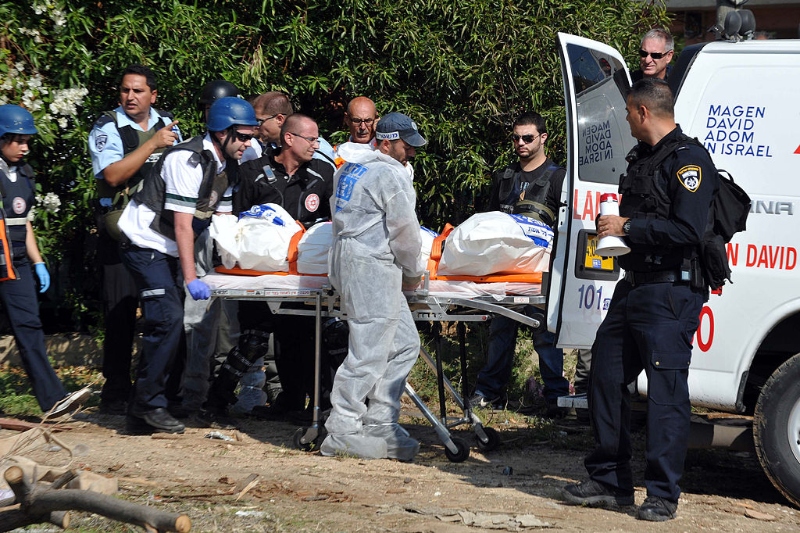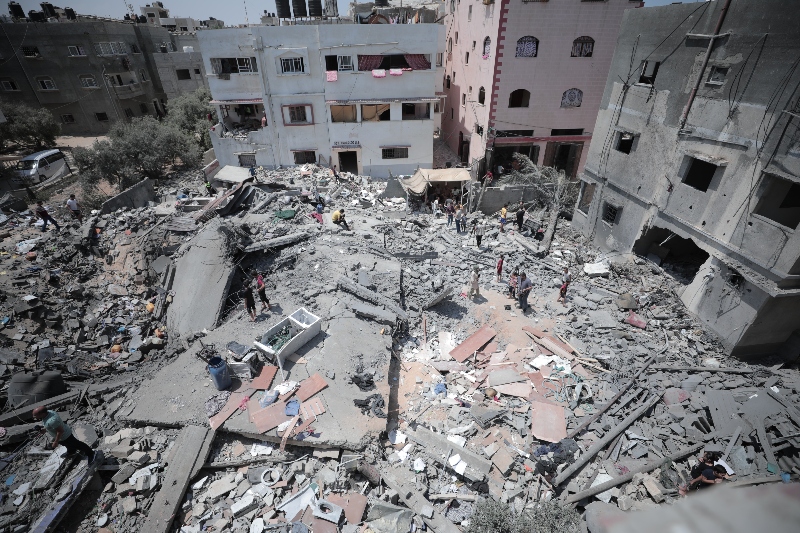Israel, Hamas, and theological responsibility
The recent atrocities perpetrated by Hamas and Israel have rightly provoked theological reflection in many places. But great caution and wisdom is needed in order to avoid fuelling the conflict further, writes Helen Paynter

The bloody violence that erupted out of Gaza on 7 October 2023 was evil and utterly unjustifiable. The bloody violence that has been perpetrated by the nation of Israel against the Palestinian people since the 1948 Nakba[1] has been evil and utterly unjustifiable.
Comment and opinion pieces since the outbreak of the fresh hostilities have commonly sought to pit one of these atrocities against the other, in terms of severity, cause, or justifiability. It is unhelpful to do so. Evil is not a quality found on one side alone. Violence does not justify violence. Calling one side’s actions evil does not (should not) equate to the endorsement of the other side. Suffering is not a competition sport. Sympathy for the victims of violence is not a zero-sum game.
We must be aware of those waiting in the wings who seek to instrumentalise these stories for their own ends. They are the antisemites who crawl out of the woodwork whenever they find a pretext. They are the Islamophobes whose hatred has also found renewed expression. They are those pushing an unconditional pro-Israel stance, which endorses an aggressive war where vastly superior military force is brought to bear upon a population that is 50 per cent children. They are the political actors beyond Israel-Palestine who are promoting their own ends and would like nothing better than to stir up a proxy war. (Of course, it is nothing new that powers beyond that small strip of land have sought to control and manipulate it for their own ends. That goes back at least as far as the Babylonian Empire.)
All of these complexities should curb our instincts to rush to comment. They should lead us to scrutinise what we have written before publishing it, double-checking whether anything we have said might be interpreted as a commendation of violence or oppression. This goes for political commentators, protestors – and theologians.
The Bible has much to say about violence. It lays bare the human tendency to distorted desire and imitative rivalry which is the root of most of the violence in the world. It exposes the cycles of shame which further fuel violent action. It unflinchingly recounts the brutality of violence in the world, and testifies to God’s patience with humanity, and his unflinching commitment to restore shalom. It bears witness to the non-violent life and death of Jesus Christ, and anticipates the eschatological shalom which his death and resurrection inaugurate.[2]

But incautious use of isolated texts or decontextualised themes can be dangerous.
Yes, the Amalekites – ancient enemies of God’s covenant people, slated for annihilation – are exemplars in Scripture of those who violently assault the weak and defenceless. But to equate them to the activities of one actor in the present conflict might lead the reader to assume that the other actor finds itself represented in the story of ancient Israel. That theology has been employed for great harm, by those who have promoted the displacement of Palestinian people and supported the settling of Jews on their homeland, all in the name of God.
Yes, the psalms invite us to pray urgently against all evil;[3] to entreat God to ‘break the fangs’ of those whose (metaphorical) teeth are tearing apart the innocent (Ps 58:6). But the cursing of evil can never be a focussed thing. It must begin with the evil in our own hearts (e.g. Ps 139:19-24), and it must equally confront evil on both sides of a conflict. To invoke these imprecatory psalms with relation to the violence of Hamas only disregards – and encourages others to disregard – the preceding and responsive violence of the Israeli government.
Yes, the Old Testament refers to the people of God as ‘Israel’ – though the name is also used for a man, a land, and the northern ten tribes after the division of the nation. To equate the modern nation of Israel with the ancient people of the same name is to eviscerate the Christ-event of its meaning.[4] To refer to biblical (Old Testament) Israel alongside reference to a contemporary nation-state that bears the same name is dangerous to the point of negligence, in this highly charged political context. To do so alongside comparison of Hamas to the Amalekites (whose fate, remember, was total destruction) is reckless. This is – at best – irresponsible theology.
Telling half a truth can be an untruth. Criticising one side of a bilaterally aggressive war can be dangerous. The incautious use of even true and good theological themes can be harmful.The Centre for the Study of Bible and Violence stands against the wilful or careless use of Scripture to promote violence. We condemn all aggressive violence, especially when it is perpetrated against non-combatants such as the 260 festival-goers massacred in Re’im on 7 October and the thousand children killed in Gaza since that date. We call for Hamas and Israel to de-escalate their violence, and for the international community to promote such a de-escalation. We call for peace with justice in the Holy Land. And we call our fellow-theologians to avoid adding fuel to the fire.
In June of 2023, the Centre for the Study of Bible and Violence co-hosted a theological conference with Bethlehem Bible College’s Christ at the Checkpoint. The videos from this conference Let Justice Roll: Scripture and Power in Palestine are available here.
Images
-
Top| Israeli first responders remove one of three victims killed by a Hamas rocket (2012) | The Israel Project | Wikimedia Commons
-
Middle | Gaza | Mohammed Ibrahim | Unsplash
The Revd Dr Helen Paynter is founding Director of the Centre for the Study of Bible and Violence (CSBV). Alongside her role as director of the Centre, Helen is a Baptist minister in Bristol, England and a tutor at Bristol Baptist College.
Her PhD thesis was on seriocomic humour in the book of Kings, and her current research interests focus mainly around the narrative hermeneutics of Old Testament texts of violence.
This reflection originally appeared in the CSBV blog, and is republished with permission.
[1] The term ‘Nakba’ (catastrophe) refers to the forced expulsion of 700,000 Palestinians from their homes, villages and farmlands during and immediately after the 1948 Palestine war. Many of these families remain in refugee camps. Since those times (and, indeed, even before them), Palestinians have been subject to the ongoing, and ever-increasing, occupation of their land – illegal by international law.
[2] For the development of all the ideas in this paragraph, see my forthcoming book Blessed are the Peacemakers: A Biblical Theology of Human Violence (Zondervan, 2023)
[3] See Trevor Laurence, Cursing with God: The Imprecatory Psalms and the Ethics of Christian Prayer (Baylor, 2022)
[4] The equating of ancient ‘Israel’ with modern Israel fails to take account of the way that the covenant promises have been fulfilled in Jesus Christ – and thereby reshaped in their realisation. It assumes an unbroken continuity between the Old Testament and modern times, when there has, in fact, been a great disruptive event which changes everything. So the people of God are now constituted on the basis of faith in Jesus Christ, with non-Jewish believers ‘grafted into’ the covenant community. Thus after the Christ event the new ‘Israel’ is neither in direct continuity with the old, nor dispenses with it. See, for example, Matt 12:48-50; Eph 2:14-16; Rom 11:17-18.
Do you have a view? Share your thoughts via our letters' page.
Baptist Times, 19/10/2023